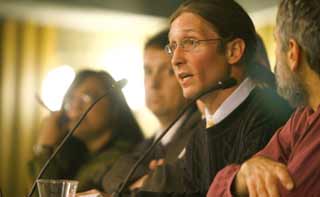Academic freedom forum held
When Ryan Morrison came to Eastern in 2003, he sparked a debate before class that ended with two of his fellow students pushing him against the wall outside.
Morrison came to class with the opinion that the United States should wait to go to war.
“It started as a joke about imperialists that went a little to far. If they wanted to debate me, I would and might be totally wrong – but all without getting physical or making me retract what I say,” Morrison said.
Morrison, senior sociology and philosophy major, was one of six panelists at last night’s forum on academic freedom that took place at the 7th Street Underground as part of President Bill Perry’s inauguration. The forum was sponsored by the University Professionals of Illinois and the Faculty Senate.
“My freedom is contingent with the faculty’s freedom. They are also based on our fellow students and their relationships with the faculty,” Morrison said. “There is a dangerous tendency to think that the values of students and professors are at odds.”
The topic of academic freedom sparked a flow of discussion that had the panelists and audience engaged in the dynamics of academic freedom, how it should be used and how to protect it.
According to Eastern academic policy, a student’s grade cannot be altered for what a student says in the classroom. Likewise, a professor has the freedom, protected under the First Amendment, to voice their opinion regardless of opposition.
“Assuming it wasn’t an offensive rant and a professor had an academic standard, faculty should stand up to defend their right of speech. I support wholeheartedly the faculty’s academic freedom,” said Charles Delman, mathematics professor.
The panel’s concerns about academic freedom pertained mainly to faculty and student privilege protection with regards to classroom discussion.
“The typical concern we hear is what people think others shouldn’t be allowed to say, usually when it attracts an unpopular idea,” Delman said. “Just because something is hurtful doesn’t mean you should legislate against that.”
One goal of Faculty Senate is to push for some academic freedom provisions in the faculty contracts, he said.
Panelist Karen Swenson, professor of political science, said she sometimes finds it difficult for students to engage in critical discussion without being graded.
“We all have preconceptions we bring into the classroom. In order to know your own beliefs are correct, you need to defend those beliefs,” Swenson said.
The panel noted another condition of academic freedom: the nature of a collegiate debate and the need for students to know topics of classroom discussion might make them uncomfortable.
“Discussion and debate – those are our duties as Americans (living) in a free democratic society,” Morrison said.
Faculty Senate Chair Lynne Curry said she would like to see another discussion on academic freedom in the future.
“We can all say that we support academic freedom,” she said. “The answers this evening won’t be the last word on this topic but is rather something we can continue to explore.”
Academic freedom forum held

Ryan Morrison, a senior sociology major, responds to a question as a panel member of Tuesday night’s Academic Freedom forum at 7th Street Underground in the Martin Luther King Jr Union.





































































